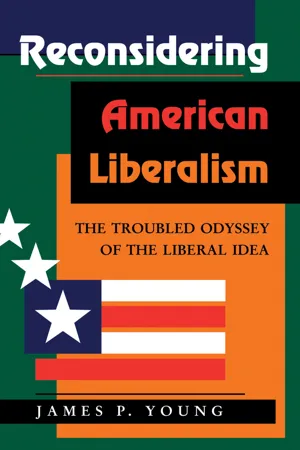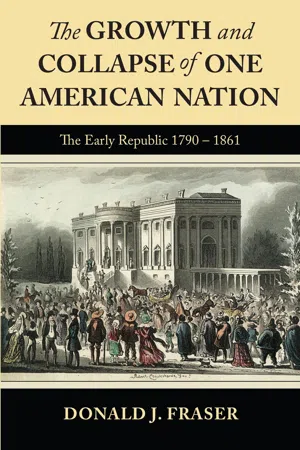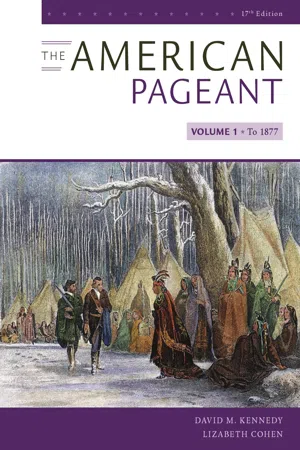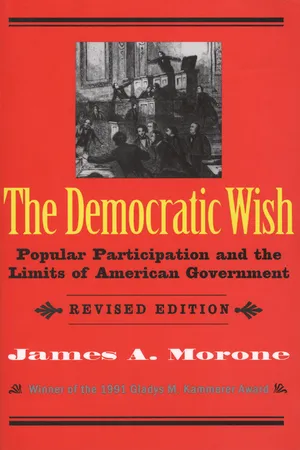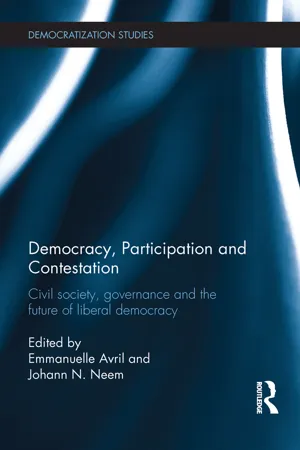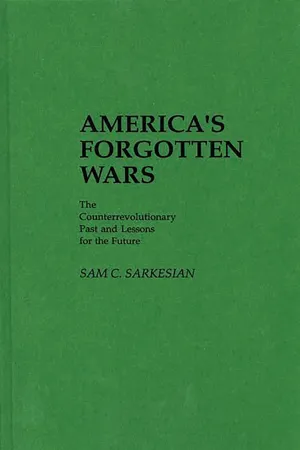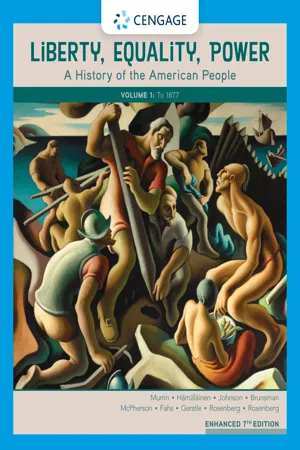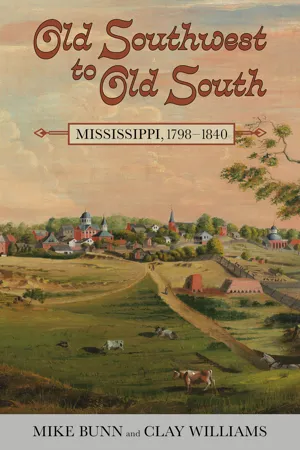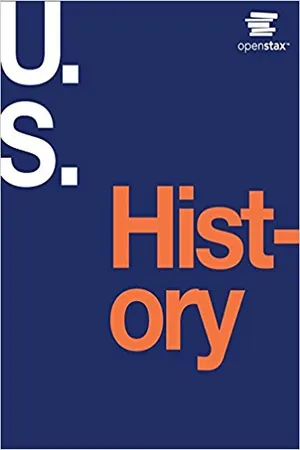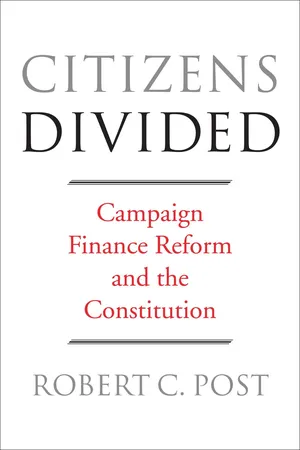History
Jacksonion Democracy
Jacksonian Democracy refers to the political movement led by President Andrew Jackson in the 1820s and 1830s. It emphasized the expansion of suffrage to white male citizens, the spoils system, and a strong executive branch. Jacksonian Democracy also promoted the idea of the common man's participation in politics and government, shaping the development of American democracy.
Written by Perlego with AI-assistance
Related key terms
1 of 5
10 Key excerpts on "Jacksonion Democracy"
- eBook - ePub
Reconsidering American Liberalism
The Troubled Odyssey Of The Liberal Idea
- James Young(Author)
- 2018(Publication Date)
- Routledge(Publisher)
6 Some Notes on Jacksonian DemocracyTHE ADMINISTRATION of Andrew Jackson (1829—1837) is more important politically than intellectually. The period featured a considerable expansion of presidential power at the expense of the states and the Congress. Jackson as president claimed the role of the "tribune of the People," the only officer of government with a national constituency. The political basis of Jackson's claim was the emergence of the first mass electoral coalitions, which followed on the removal in the various states of the remaining restrictions on universal manhood suffrage. The convention system for the nomination of presidential candidates was developed as a democratic antidote to the earlier device of choice by party congressional caucuses, an ironic event, since today conventions are themselves seen as antidemocratic devices designed to ensure control by party bosses. The spoils system for the allocation of administrative positions, which gave the president greater control over the executive branch, was also created. In general, then, it was a period of rapid democratization.The Jacksonian Ideology
Aside from these political developments, the question of the meaning of the Jacksonian movement is contested territory. The starting point for any consideration of the intellectual history of the period must be the magisterial Age of Jackson, by Arthur Schlesinger, Jr., perhaps the last great work to be written squarely in the tradition of progressive historiography.1 Schlesinger took as his text a passage from George Bancroft: "The feud between the capitalist and the laborer, the house of Have and the house of Want, is as old as social union, and can never be entirely quieted."2 And elsewhere: "Show me one instance where popular institutions have violated the rights of property, and I will show you a hundred, nay a thousand instances, where the people have been pillaged by the greedy cupidity of a privileged class."3 Published well before the Communist Manifesto, - eBook - ePub
The Growth and Collapse of One American Nation: The Early Republic 1790 - 1861
The Early Republic 1790-1861
- Donald J Fraser, Dotti Albertine(Authors)
- 2020(Publication Date)
- Fraser & Associates(Publisher)
4As for Andrew Jackson, his view of ethnic and racial differences was typical for the times that he lived in. “Inequalities that others deemed artificial—especially between blacks and whites, Indians and settlers, men and women—appeared to Jackson, as they did to most American contemporaries, perfectly natural,” Wilentz writes. Still, he lacked the subtly of Jefferson, who knew that slavery was wrong and attempted to implement an enlightened, if paternalistic, policy toward the Indians. Particularly on Indian policy, Jackson’s “campaign for Indian removal tied the movements for economic development, territorial expansion, racial discrimination, white democracy, and the spread of slavery together,” historian Harry Watson argues. Like Jefferson, Jackson stood against the privilege of the elites and feared the return of aristocratic politics. He believed it was his duty to protect “the independent rights of our nation,” and the legacy of the revolution, an inherently Jeffersonian perspective. Unlike his main opponent in both 1824 and 1828, John Quincy Adams, Jackson would never see that slavery was wrong.5Two Fateful Elections
The method for selecting the president was gradually evolving, and the elections of 1824 and 1828 saw some major changes. Initially, electoral college candidates were selected by state legislatures. By 1824, eighteen of the twenty-four states assigned presidential electors by popular vote, and fourteen of these used a winner-take-all approach where the top vote getter received all that state’s electoral votes. Still, the total number of people that voted in the presidential election of 1824 was quite small, with a total of 350,000 ballots cast. By way of comparison, in 1828 there were almost 1.2 million votes recorded. The method for selecting a presidential candidate was also undergoing change. Since 1796, the Republican Party had selected its presidential candidate by a caucus of its congressional members, referred to as King Caucus. But this system collapsed in 1824 and would eventually be replaced by a somewhat more democratic convention in which party members and officeholders together selected the presidential candidate.6 - eBook - PDF
- David Kennedy, Lizabeth Cohen(Authors)
- 2019(Publication Date)
- Cengage Learning EMEA(Publisher)
All Rights Reserved. May not be copied, scanned, or duplicated, in whole or in part. Due to electronic rights, some third party content may be suppressed from the eBook and/or eChapter(s). Editorial review has deemed that any suppressed content does not materially affect the overall learning experience. Cengage Learning reserves the right to remove additional content at any time if subsequent rights restrictions require it. What Was Jacksonian Democracy? A ristocratic, eastern-born historians of the nineteenth century damned Jackson as a backwoods barbarian. They criticized Jacksonianism as democracy run riot—an irre-sponsible, ill-bred outburst that overturned the electoral sys-tem and wrecked the national financial structure. In the late nineteenth and early twentieth centuries, how-ever, another generation of historians came to the fore, many of whom had grown up in the Midwest and rejected the elitist views of their predecessors. Frederick Jackson Turner and his disciples saw the western frontier as the fount of democratic virtue, and they hailed Jackson as a true hero sprung from the forests of the West to protect the will of the people against the moneyed interests, akin to the progressive reformers of their own day. In his famous 1893 essay, “The Significance of the Frontier in American History,” Turner argued that the United States owed the survival of its democratic tradition to the rise of the West, not to its roots in the more conservative, aristocratic East. When Arthur M. Schlesinger, Jr., published The Age of Jackson in 1945, however, the debate on Jacksonianism shifted dramatically. Although he shared the Turnerians’ admiration for Jackson the democrat, Schlesinger cast the Jacksonian era not as a sectional conflict, but as a class conflict between poor farmers, laborers, and noncapitalists on the one hand, and the business community—epitomized by the Second Bank of the United States—on the other. - eBook - PDF
The Democratic Wish
Popular Participation and the Limits of American Government, Revised Edition
- James A. Morone(Author)
- 2008(Publication Date)
- Yale University Press(Publisher)
The Resistible Rise of the Common Man: Jacksonian Democracy You may say to all. . . Adamsites that the barnacles will be scraped clean off the ship of state. Most . . . stick so tight that the process will doubtless be fatal to them. —A Jackson supporter, 1828 The Democratic panacea, after all, was a fraud like any other. The young Republic had rid itself of one gang of political streptococci only to take on another. —H. L. Mencken On the face of it, Americans have rarely pursued their democratic wishes with the fervor they showed in the second quarter of the nine-teenth century. Here was the frontier, universal** (meaning white, male) suffrage, booming political participation, and an era named after the common man. The Progressive historians found in this period another clash between the house of Have and the House of Want. In their view, Andrew Jackson articulated the democratic aspirations of the plain people** and led a charge against the privileges and perquisites of broadcloth. Still, the conflict historians differed over who the common man was and whom, precisely, he was fighting: frontier democrat against Eastern conservative? proletariat against capitalist? artisan against entrepreneur? 1 74 2 Jacksonian Democracy On the other side, consensus historians see barely a fight at all. There were, in this view, hardly any really rich or poor Americans, just a rising middle class, throwing itself into enterprise. No admission here, Richard Hofstadter quotes an immigrant, except on business. The democratic tumult came from the middle class, opening every possible pathway for the ambitious and the talented. 2 In either analytic tradition, it was not a tidy political event. The Jacksonian Democrats, for example, willingly accepted slavery; their ostensibly conservative rivals demanded immediate abolition. The Jack-sonians fought for less government; Whigs wanted more. - eBook - ePub
Democracy, Participation and Contestation
Civil society, governance and the future of liberal democracy
- Emmanuelle Avril, Johann Neem(Authors)
- 2014(Publication Date)
- Routledge(Publisher)
Part IContested definitions of democracyPassage contains an image
The emergence of competing democracies in the United States Reeve Huston1Rethinking 1828Nobody had ever seen anything like it. By ten in the morning on March 4, 1829, the streets were jammed with fancy carriages and farmers’ carts, “filled with women and children, some in finery and some in rags.” They had all come to see Andrew Jackson be sworn in as the new President of the United States. After the new president swore his oath and gave his speech, a long procession of “country men, farmers, gentlemen, […] boys, women and children, black and white” followed him to the White House and descended upon the presidential reception. The crowd smashed several thousand dollars’ worth of glass and china in the rush to get at the refreshments. Jackson was nearly crushed as the crowd pressed in on him to shake his hand. Men and boys in muddy boots entered through windows and climbed on the furniture to get a peek at the new president (Wilentz, 2010).This scene has become what Sean Wilentz calls a “set piece of American political lore.” For all the disputes among historians about the character of Jacksonian-era politics, all agree that something new was happening. Some historians spy in the smashed china and muddied furniture evidence of an emerging golden age of American democracy, one that ushered in unprecedented popular participation in politics. Others exhibit varying levels of skepticism, from Ronald Formisano’s (1983) careful and ambivalent analysis of how democratic the so-called Second Party System was, to Edward Pessen’s (1978, 1984) dismissal of Jacksonian democracy as an elite sham. Whether sham or not, all agree that the election of Andrew Jackson in 1828 marked the beginning of a new era of partisan democracy (Leonard, 2002; Schlesinger, 1945; Sellers, 1994; Silbey, 1991; Watson, 1981, 1990; Wilentz, 2010). - eBook - PDF
America's Forgotten Wars
The Counterrevolutionary Past and Lessons for the Future
- Sam C. Sarkesian(Author)
- 1984(Publication Date)
- Praeger(Publisher)
2 State of the Nation THE JACKSONIAN ERA AND THE END OF REVOLUTIONARY AMERICA The Jacksonian period is generally viewed as a watershed in American politics. Andrew Jackson brought to the White House a vigorous and overpowering leadership style, which he nurtured by consistently re- lating his office to the people. Strengthened by his populist image, he expanded the concept of the presidency and established what many consider the beginnings of the modern presidency. Although there is some disagreement regarding the meaning of the Jacksonian presidency, it seems clear that Andrew Jackson linked the power of the office to a popular mandate and presided over an important period in American history. The age of Jackson was marked by major changes in politics, demographics, and socioeconomic patterns. At the same time it opened the doors for the expansion of the United States across the continent and laid the groundwork for industrial development. The War of 1812 established Jackson's national reputation, which he used as a springboard to the presidency. In the aftermath of the war, America shed its revolutionary past, creating the groundwork for its own particular political and economic system. As a result, the presidency emerged as the dominant national office. This dominance was also the result of the strength of the presidential political party and of those who occupied the office: John Adams, Thomas Jefferson, James Madison, James Monroe, and Andrew Jackson. By the second decade of the nine- teenth century, the president had secured the primary role in deter- mining the direction of policy. This role was a far cry from what the 22 America's Forgotten Wars Founding Fathers had envisioned when they offered the presidency to George Washington. Presidential influence on policy and the vigor of its implementation were particularly important during the Second Sem- inole War. The Jacksonian era was preceded by important changes in the political party system. - No longer available |Learn more
Liberty, Equality, Power
A History of the American People, Volume I: To 1877, Enhanced
- John Murrin, Pekka Hämäläinen, Paul Johnson, Denver Brunsman(Authors)
- 2019(Publication Date)
- Cengage Learning EMEA(Publisher)
11-5 Jacksonian Democracy and the South Q At the national level, how did Jacksonian Democrats and their rivals deal with widening differences between the North and South? Andrew Jackson was a national figure, but his base of support was in the South, where he won 8 of every 10 votes in 1828. Southerners had grown wary of an activist government in which they were in the minority. They looked to Jackson not only as a military hero but also as a Tennessee planter who talked about 11.7 The President’s Levee Robert Cruikshank drew Jackson’s inaugural reception with men and women of all classes, children, dogs, and buck- ing horses celebrating the Old General’s victory. Cruikshank subtitled his lithograph “All Creation Going to the White House.” Q What does the picture reveal about how citizens saw and related to the institution of presidency in the 1830s? Library of Congress Prints and Photographs Division [LC-USZC4-970] CHAPTER 11 Whigs and Democrats, 1815–1840 316 11-5b Indian Removal President Jackson agreed that the federal government lacked the authority to recognize native sovereignty within a state and declared that he could not protect the Cherokees and the other Civilized Tribes from state governments. Instead, he offered to remove them to federal land west of the Mississippi, where they would be under the authority of the benevolent federal government. Congress made that offer official in the Indian Removal Act of 1830. The Cherokees, with the help of New England missionaries, had taken their claims of sovereignty to court in the late 1820s. In 1831, John Marshall’s Supreme Court ruled in Cherokee Nation v. Georgia that the Cherokees could not sue Georgia because they were not a foreign nation but a “domestic depen- dent nation”—a dependent of the federal government, and not of the state of Georgia. - eBook - ePub
Old Southwest to Old South
Mississippi, 1798-1840
- Mike Bunn, Clay Williams(Authors)
- 2023(Publication Date)
- University Press of Mississippi(Publisher)
12.4. Title page of Mississippi’s 1832 state constitution, which granted voting rights to all white men in Mississippi. (Courtesy of Mississippi Department of Archives and History)To the great majority of Mississippi’s voting public in the 1830s, notions of personal freedom and the proper distribution of power had little to do with such protections afforded minority groups within the state. Instead, they lay bound up in the concept of government that became personified by one of the most influential leaders in American history—Andrew Jackson. The very presence of Jackson and the redistribution of power he came to represent during the close of Mississippi’s frontier era proved pivotal not only in individual elections but in knitting the very fabric of Mississippi’s antebellum political party infrastructure. Dating to the appointment of aloof Federalist Winthrop Sargent as the first territorial governor in 1798 and the “Revolution of 1800,” which swept Democratic-Republican Jeffersonian allies into power throughout the territory, the state’s chaotic politics had always featured factionalism in some form. While some of this political rivalry aligned with national party organizations, to the extent that it did it was usually in favor or in opposition to the current presidential administration. Parties, in the modern sense of the word, simply did not exist in the Magnolia State until the rise of Jackson on the national scene. “Pluralistic and localistic” in the words of one leading scholar of politics in frontier Mississippi, the state’s politics reflected an “intrastate localism” with weak and shifting allegiances before the Jackson–John Quincy Adams presidential contest brought about a coalescing of factions that operated as true parties.17In many ways Mississippi stood at the epicenter of the political phenomenon known as Jacksonian Democracy. The movement empowered the “common man” and consequently broadened public participation in politics. Among its main tenets it advocated limited federal government and a full-throated endorsement of the concept of Manifest Destiny, construed in the South to mean in immediate terms the removal of any native groups who stood in the way of the expansion of slavery and the Cotton Kingdom. While popular to some degree nationally, it had special appeal in the South during Mississippi’s formative statehood years, and it swept all that came before it in the region. It gave shape and direction to a wide variety of political questions and helped the region find a collective sectional voice under which it could unite in arguing for its interests. - eBook - PDF
- P. Scott Corbett, Volker Janssen, John M. Lund, Todd Pfannestiel, Paul Vickery, Sylvie Waskiewicz(Authors)
- 2014(Publication Date)
- Openstax(Publisher)
Explore a Library of Congress (http://openstaxcollege.org/l/15PolPrints) collection of 1830s political cartoons from the pages of Harper’s Weekly to learn more about how Andrew Jackson was viewed by the public in that era. Click and Explore 286 Chapter 10 | Jacksonian Democracy, 1820–1840 This OpenStax book is available for free at https://cnx.org/content/col11740/1.3 10.4 Indian Removal By the end of this section, you will be able to: • Explain the legal wrangling that surrounded the Indian Removal Act • Describe how depictions of Indians in popular culture helped lead to Indian removal Pro-Jackson newspapers touted the president as a champion of opening land for white settlement and moving native inhabitants beyond the boundaries of “American civilization.” In this effort, Jackson reflected majority opinion: most Americans believed Indians had no place in the white republic. Jackson’s animosity toward Indians ran deep. He had fought against the Creek in 1813 and against the Seminole in 1817, and his reputation and popularity rested in large measure on his firm commitment to remove Indians from states in the South. The 1830 Indian Removal Act and subsequent displacement of the Creek, Choctaw, Chickasaw, Seminole, and Cherokee tribes of the Southeast fulfilled the vision of a white nation and became one of the identifying characteristics of the Age of Jackson. INDIANS IN POPULAR CULTURE Popular culture in the first half of the nineteenth century reflected the aversion to Indians that was pervasive during the Age of Jackson. Jackson skillfully played upon this racial hatred to engage the United States in a policy of ethnic cleansing, eradicating the Indian presence from the land to make way for white civilization. In an age of mass democracy, powerful anti-Indian sentiments found expression in mass culture, shaping popular perceptions. - eBook - PDF
Citizens Divided
Campaign Finance Reform and the Constitution
- Robert C. Post(Author)
- 2014(Publication Date)
- Harvard University Press(Publisher)
It was during this time that the log cabin emerged as the symbol of popular authen-ticity for political candidates. 126 With the growth in national population, moreover, the electorate could not possibly possess firsthand experience of the individual quality of particular candidates. On what basis, then, could the electorate select representatives with whom they could sustain a “due connection”? How could representative integrity be maintained? Second, how could even the most trustworthy representatives retain the confidence of the people, if their ability to affect government action was constrained by the separation of powers? If representatives needed to make government responsive to popular opinion in order to maintain a suitable “communion of interests and sympathy of sentiments” with their constituents, and if government responsiveness was paralyzed by the mechanical checks and balances so lovingly fashioned by the Framers, how could the connection between representation and self-government be sustained? The invention of the second American party system proved a solution to both these challenges. 127 The Jacksonian era witnessed an upwelling of organized and disciplined political parties, replete with partisan ri-valry and “party warfare.” 128 “The Jacksonians . . . created the first mass democratic national political party in modern history.” 129 Elections were the crucial events for this new democracy, toward which all organizing efforts led. But elections were only the culmination of a contin-ual effort to draw together the faithful. In place of the discarded nominat-ing caucuses, the Jacksonians substituted a national network of commit-tees, reaching up from the ward and township level to the quadrennial A Short History of Representation and Discursive Democracy 21 national convention, each a place where, at least in principle, the popular will would be determined and ratified.
Index pages curate the most relevant extracts from our library of academic textbooks. They’ve been created using an in-house natural language model (NLM), each adding context and meaning to key research topics.
